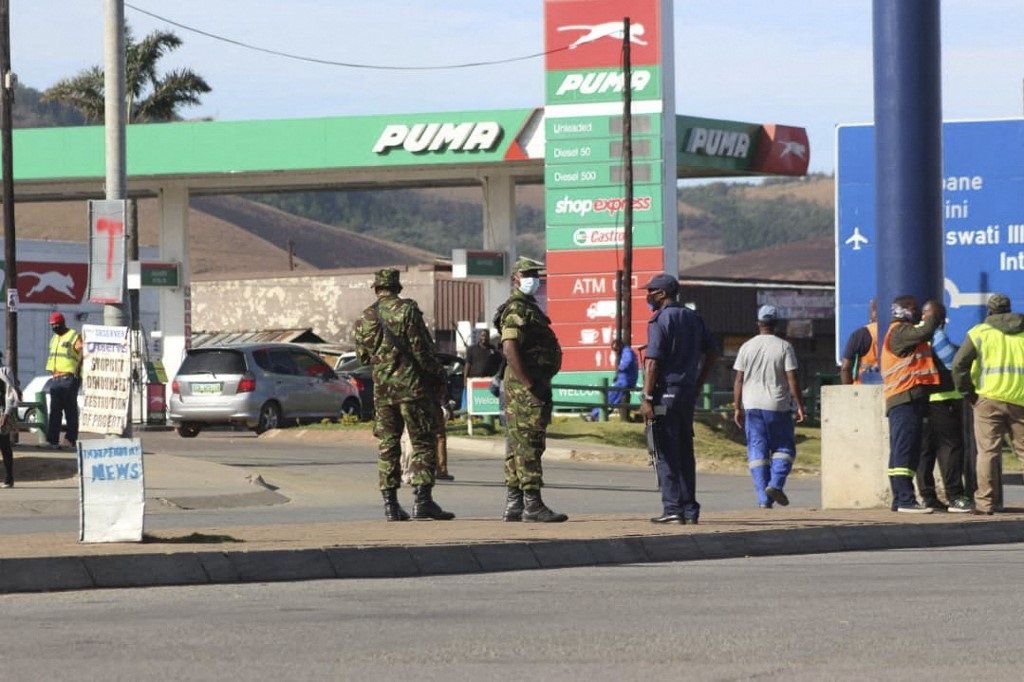
eSwatini Soldiers open fire at US Diplomatic Car as Pro-democracy Protests surge
Published on July 9, 2021 at 10:23 AM by Chisomo Kambale
As chaos looms in the Eswatini’s deadly pro-democracy protests, soldiers fired on a United States diplomatic vehicle.
The US Embassy in Eswatini confirmed the incident on Thursday in a tweet, saying “shots were fired at an embassy vehicle on July 1 and we informed the Ministry of Foreign Affairs of the incident via diplomatic note, a standard form of communication [between] diplomatic missions & MFA.”
We can confirm shots were fired at an embassy vehicle on July 1 and we informed the Ministry of Foreign Affairs (MFA) of the incident via diplomatic note—a standard form of communication btwn diplomatic missions & MFA. We are working closely with the MFA to address the incident.
— U.S. Embassy Eswatini (@USEmbEswatini) July 8, 2021
A diplomatic note between the two embassies was leaked to the media.
In the note, dated 3 July, the US Embassy said a soldier of the Eswatini Defence Force shot three live rounds at a diplomatic vehicle, with one shot striking the vehicle.
The same vehicle was then stopped at a checkpoint, where soldiers pointed weapons at the vehicle, and attempted to search the diplomatic vehicle, the note stated.
The search by soldiers was in contravention of the Vienna Convention on Diplomatic Relations.
The Eswatini government did not respond to a request for comment.
The US, along with the United Kingdom and European Union in Eswatini, issued a joint statement, urging the government to “exercise restraint” in its response to protesters.
The missions also urged protesters to “demonstrate and voice their concerns through non-violent means”.
The statement was released on 1 July, the same day that soldiers fired shots at the diplomatic vehicle.
After weeks of smaller demonstrations, the protests in Eswatini gained momentum last Tuesday, leading to the burning and looting of dozens of shops and businesses.
The Eswatini government said 27 people have been killed in the violence.
Activists said at least 50 were killed, and the death toll could be as high as 70, accusing the military and police of indiscriminate violence against demonstrators.
According to SABC News, the unrest in Eswatini, a monarchy formerly known as Swaziland, began in May when a law student was murdered “in circumstances that suggested police involvement.”
Those protests grew into “daily pro-democracy marches” in late June, the United Nations said in a release on Tuesday, with protestors calling for change to a system with an elected prime minister.
The monarch of Eswatini, King Mswati III, has indulged in “a lavish lifestyle of luxury cars and palaces” while more than half of the country’s citizens “are on the brink of hunger” and live in poverty, the Times reports.
Protestors attempted to get petitions with their demands to members of Parliament, but the government put “a ban on the in-person delivery of petitions” and said they had to be sent by email, which fueled the protests even more.
Eswatini has since “descended into the most explosive civil unrest in its 53 years of independence,” according to the SABC News, which has led to a “more general breakdown in law and order.”


